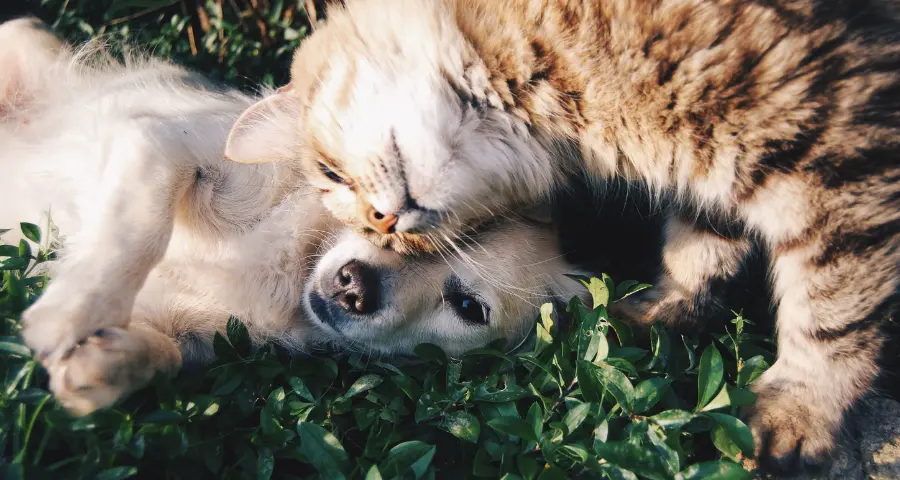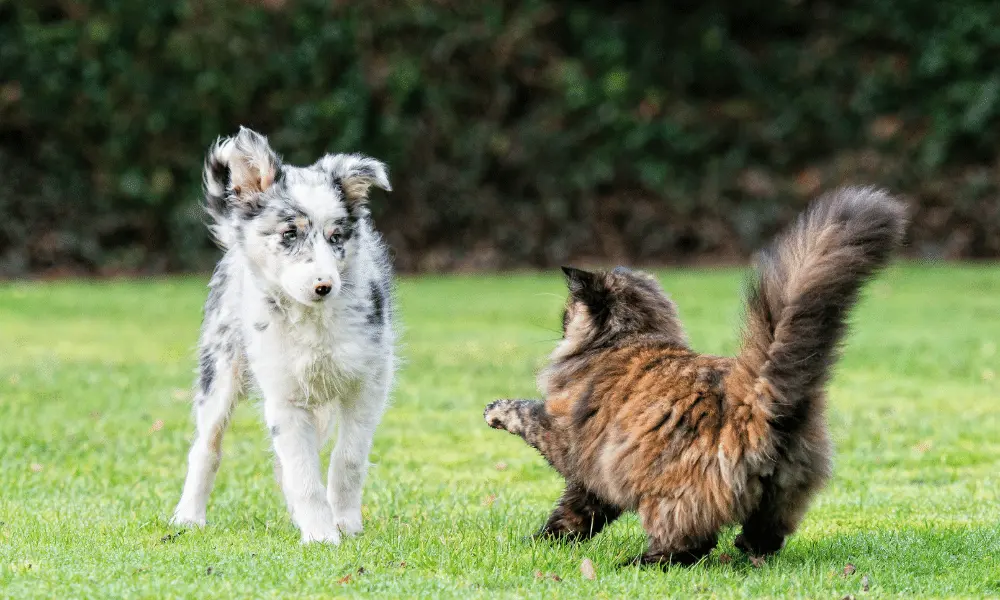The relationship between dogs and cats is often a subject of curiosity for all animal friends. Dogs attacking cats is one of the situations where this relationship is sometimes experienced in a negative dimension. But why does this tendency of dogs to attack cats arise, which is caused by origin factors, body language, secreted hormonal odors and human manipulation? In this blog post, I will explain why dogs can attack cats and discuss the possibility of preventing this attack tendency.
Why Dogs Attack Cats

Dogs’ tendency to attack cats can be caused by many different factors. Dogs may see cats as potential prey because they have natural predatory instincts. In addition, dogs’ social behavior and environmental factors can also be influential in their aggressive tendencies.
Attack Tendencies Due to Origins Factors: Dogs’ aggressive tendencies towards cats can be due to their genetic origins. Certain dog breeds are known for their hunting skills and are more likely to see cats as prey. Sheepdogs and terriers, for example, may be more prone to this type of attack.
Attack Tendency Due to Body Language: Dogs’ body language can influence their tendency to attack. For example, dogs can take a threatening position by raising their tails and showing their teeth. Dogs that show this type of body language may exhibit aggressive behavior towards cats.
Attack Tendency due to Origins Factors

Dogs’ tendency to attack cats stems from underlying factors. Dogs and cats, being different species, naturally have different behavioral patterns. Origins can stem from factors such as the animals’ genetic makeup, training and social background.
The genetic makeup of dogs can influence this species’ tendency to attack cats. Some dog breeds may be more prone to aggression because they were bred as hunting dogs or guard dogs. However, every dog is an individual and genetic factors alone are not enough to determine the propensity to attack.
Training and social background can also influence a dog’s tendency to attack cats. It is important that dogs receive good early training, go through an appropriate socialization process and grow up with different types of animals. If a dog does not have positive early experiences with cats or does not receive proper training, it may show aggression towards cats.
Attack Tendency Based on Body Language

The relationship between dogs and cats can sometimes be friendly and loving, but other times it can involve aggression. Many people wonder why dogs attack cats. This tendency to attack can occur due to a variety of factors and can be accompanied by various signals, which can come from body language.
A dog’s tendency to attack can often be read in its body language. For example, signs such as sudden and tense movements, arching its back, raising its tail or fluffing up its fur may indicate that the dog perceives the cat as a threat. Also, if the dog avoids eye contact or stares at the cat with a hard stare, this can be a sign of a tendency to attack.
Sometimes dogs attack cats in self-defense or in defense of their owners. This can be especially true if the dog has been harmed by the cat as a result of a previous experience. In addition, there is also a tendency for dogs to attack due to their natural predatory behavior. Many dog species have a hunting instinct and cats can trigger this instinct with their actions.
Attack Tendency Caused by Secreted Hormonal Odors
Dogs are known for their tendency to attack cats. There are several reasons for this aggressive tendency and one of them is the hormonal odors released. Dogs are often very sensitive to smells in their environment and these smells influence their behavior.
Dogs can startle cats and other animals with the hormones they secrete and increase their tendency to attack. In particular, the estrogen hormone secreted by female dogs can have an effect on male dogs and make them more aggressive.
These hormonal odors are detected by dogs’ sense of smell and can induce a sense of aggression in their brains. Therefore, dogs tend to become aggressive when they smell these odors near the cat.
The fact that secreted hormonal odors increase dogs’ tendency to attack can be a significant problem. Pet owners in particular should pay attention to this issue to keep their dogs under control. They can consult veterinarians to prevent or reduce their dogs’ exposure to certain hormonal odors.
Attack Tendency due to Human Orientation
Dogs’ tendency to attack cats is often attributed to the animals’ natural instincts. However, in some cases, dogs’ aggressive behavior can be the result of human manipulation. Human manipulation of dogs into bad behavior can cause dogs to attack cats.
The tendency to attack due to human manipulation can be influenced by a variety of factors. For example, dogs living in a constantly cramped environment around dogs can cause them to become stressed and exhibit aggressive behavior. In addition, owners rewarding or encouraging their dogs’ aggressive tendencies can also contribute to this behavior.
To reduce the tendency of dogs to attack cats, it is important for owners to be careful and provide the right guidance. Dogs should be given regular exercise to help them socialize and live in harmony with other animals in their environment. Also, dogs’ stress levels should be reduced and positive behaviors should be rewarded. This way, dogs can reduce their tendency to attack cats and live more harmoniously.






